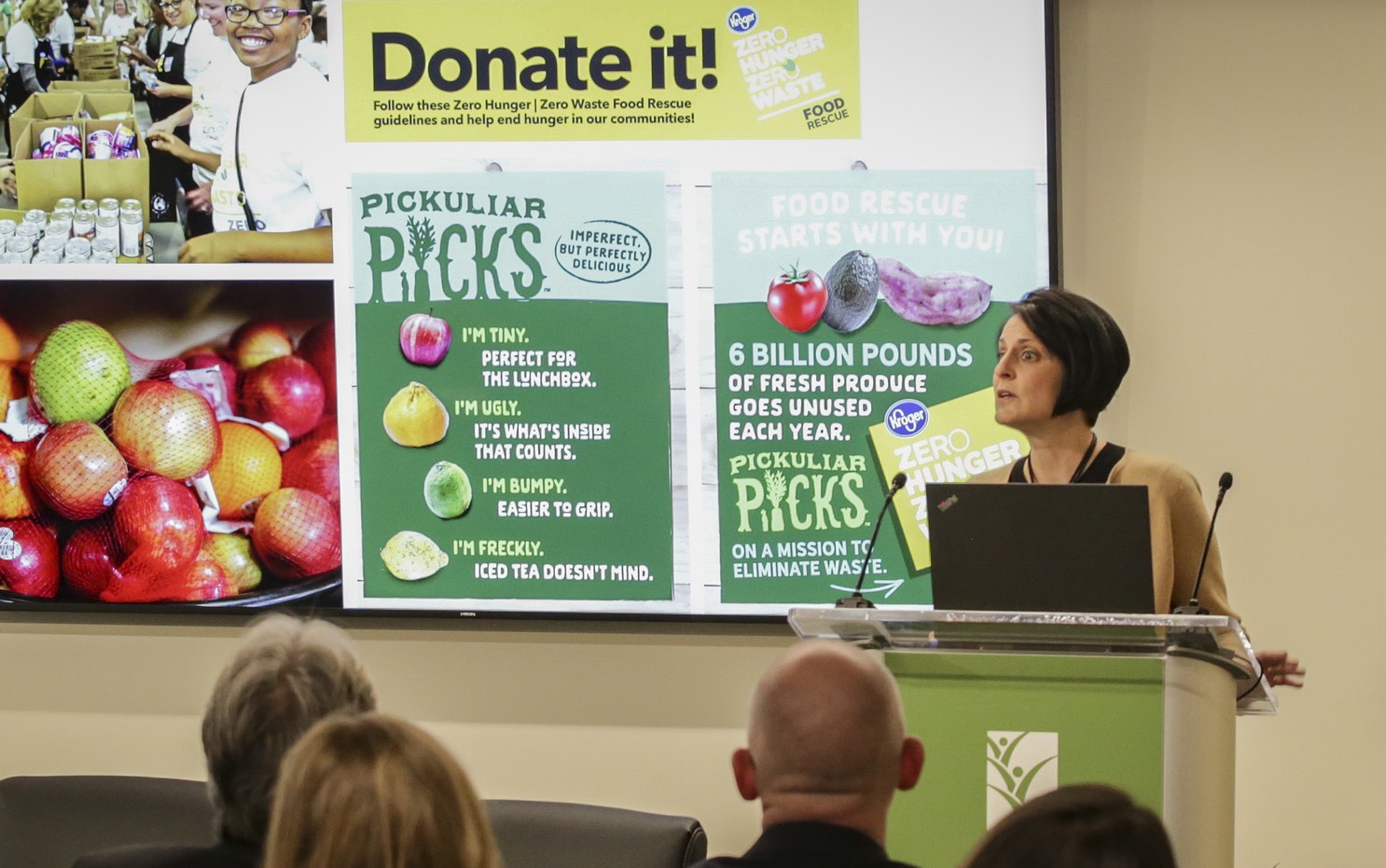Food loss and waste is a huge global problem found everywhere along the chain from producer to consumer, and a key focus of UN Sustainable Development Goal (SDG) 12, whose Target 12.3 aims to halve per capita food losses by 2030.
On March 12, IFPRI partnered with Stop Wasting Food (the organization founded by Danish activist Selina Juul), the World Resources Institute (WRI), Champions 12.3, and the Embassy of Denmark in Washington to host an event, Reducing Food Loss and Waste – Making it Personal, that explored the challenges of this issue and showcased innovative solutions from the private and public sectors.
“We need action and more action … solutions exist, and we can all contribute in a meaningful way,” said Troels Mandel Vensild, Minister Counsellor of Food, Agriculture and Fisheries at the Danish Embassy. He polled the audience on who they believed are key players in tackling food loss and waste, what they do as individuals to fight food waste at home, and their suggestions for the best ways to scale up ideas and businesses that fight food waste. (Results here.)
“We know that we are wasting 1.3 billion tons of food every year—double China’s total annual food consumption,” said IFPRI Director General Shenggen Fan. Most foods that are lost or wasted are nutritious, healthy foods, he said, with 60-70 percent of that loss occurring before the food leaves farms. Fan noted that significant knowledge gaps remain on this important issue that deserve further study. Overall, he said, improving agricultural and food chain technologies, harvesting practices, and education at the household level can help to tackle the problem. “If we can cut food waste and loss in half by 2030,” Fan said, “we can win on many things—climate change, food and nutrition security, economically—triple or quadruple wins.”
The World Bank views the fight to reduce food loss and waste through its close links to climate change, said WB economist Dipti Thapa. The problem costs trillion of dollars per year, she said, and countries cannot meet Paris climate commitments without addressing it—overall it accounts for about 8 percent of global greenhouse gas emissions. A food systems approach can help countries achieve target 12.3, Thapa said—that will require systematic efforts to gather and analyze country data on food loss and waste and use that to develop sound policies.
The causes of food losses in developing countries are complex, but the solutions are simple, said Rob Vos, director of IFPRI’s Markets, Trade and Institutions Division. Most research on the issue looks at food loss quantities across the value chain, Vos said, but it is critical to consider how proposed fixes will impact producers. “If the incentives aren’t right for farmers, if they can’t make money in the markets, then any simple technological solution will not work,” he explained.
The FoodBytes and Terra programs sponsored by Rabobank are examples of the company’s commitment to changing the way they grow, distribute, and consume food, said Rabobank Relationship Manager Victoria Prowse. Participants in FoodBytes—a networking platform connecting food and agriculture startups with investors— have created digital tools that allow, for example, real-time data monitoring of discarded food in commercial kitchens—resulting in reductions in waste and more sustainable businesses. Rabobank, she said, ensures that these disruptors have access to public platforms, are connected to clients, investors, and industry leaders to pilot their programs and try new technology.
Several presenters offered examples of ways to repurpose food that would otherwise be discarded, a key component in reducing food waste.
“Zero Hunger, Zero Waste” by 2025 is the Kroger Company’s goal, according to Senior Director for Corporate Affairs Denise Osterhues. With over 500,000 associates and 9 million shoppers daily, Osterhues noted that the supermarket chain donated over 90 million pounds of food in 2018. “We know we can’t do it alone and that it’ll take all of us working together—customers, associates, communities—to achieve our vision,” Osterhues said. Going forward, she explained, the company is supporting public policy and infrastructure improvements and donating a total of 3 billion balanced meals by 2025 to promote health and nutrition in the communities where it operates.
“Waste is wrong,” said Amy Bachman, DC Central Kitchen’s director of procurement and sustainability, outlining how the social enterprise trains people recently released from prison in cooking and handling food, and in minimizing food waste, so that they can get jobs in the food service industry. The organization’s national Campus Kitchens Project trains college students to recover unused food from cafeterias, grocery stores etc. and turn them into meals for their local communities.
“We found that we need to put self-benefit first—save money and save the planet instead of save the planet and save money,” said Daniel Ratner, partner & head of growth at YourLocal, whose app lets restaurants sell unused food around the close of business for reduced prices—
offering additional income for restaurants and savings for users.
WRI Food Program Fellow Esben Lunde Larsen invited the audience to join him in the office food waste challenge that aims to cut waste in half by 2030. In a single year, he said, WRI reduced its waste from 14 pounds to 3 pounds daily, and hopes to get that number to zero.
“We have a moment now!” said WRI Executive Vice President and Managing Director Manish Bapna, wrapping up the event. Food loss and waste is higher on the global agenda than ever before, he said, but the challenge will be in leveraging the attention to sustain the effort, as the potential gains are significant and undeniable.
Katarlah Taylor is an IFPRI Senior Events Specialist.







